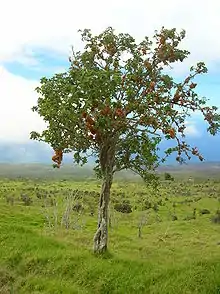Nothocestrum latifolium
Nothocestrum latifolium, commonly known as broadleaf ʻaiea, is a species of flowering plant in the nightshade family, Solanaceae, that is endemic to Hawaiʻi. It can be found in dry and mesic forests at elevations of 460–1,530 m (1,510–5,020 ft) on the islands of Maui, Molokaʻi, Lānaʻi, Oʻahu, and Kauaʻi.[3] Broadleaf ʻaiea is threatened by habitat loss. The CDP of ʻAiea on Oʻahu was named after this species.[4]
| Nothocestrum latifolium | |
|---|---|
 | |
| Scientific classification | |
| Kingdom: | Plantae |
| Clade: | Tracheophytes |
| Clade: | Angiosperms |
| Clade: | Eudicots |
| Clade: | Asterids |
| Order: | Solanales |
| Family: | Solanaceae |
| Genus: | Nothocestrum |
| Species: | N. latifolium |
| Binomial name | |
| Nothocestrum latifolium | |
| Synonyms | |
Uses
Native Hawaiians used the soft, greenish wood of ʻaiea to make pale (gunwales) for waʻa (outrigger canoes) and ʻaho (thatching sticks).The reddish yellow berries were sometimes eaten, while the bark and leaves were used for (unspecified) medicinal purposes.[5]
References
- World Conservation Monitoring Centre 1998. Nothocestrum latifolium. 2006 IUCN Red List of Threatened Species. Downloaded on 22 August 2007.
- "Nothocestrum latifolium". Integrated Taxonomic Information System. Retrieved 24 June 2010.
- "ʻaiea, halena". Hawaiian Ethnobotany Database. Bernice P. Bishop Museum. Retrieved 2009-03-22.
- Medeiros, AC (Spring 2003). "The Pū ʻOlē ʻOlē" (PDF). Native Plants. Native Plants Network: 51. Archived from the original (PDF) on 2011-07-16.
- Medeiros, A. C.; C.F. Davenport; C.G. Chimera (1998). "Auwahi: Ethnobotany of a Hawaiian Dryland Forest" (PDF). Cooperative National Park Resources Studies Unit, University of Hawaiʻi at Mānoa. Cite journal requires
|journal=(help)
External links
| Wikimedia Commons has media related to Nothocestrum latifolium. |
| Wikispecies has information related to Nothocestrum. |
- Barboza, Rick (2008-11-21). "Rarity bears aromatic blossoms". Honolulu Star-Bulletin.
This article is issued from Wikipedia. The text is licensed under Creative Commons - Attribution - Sharealike. Additional terms may apply for the media files.
